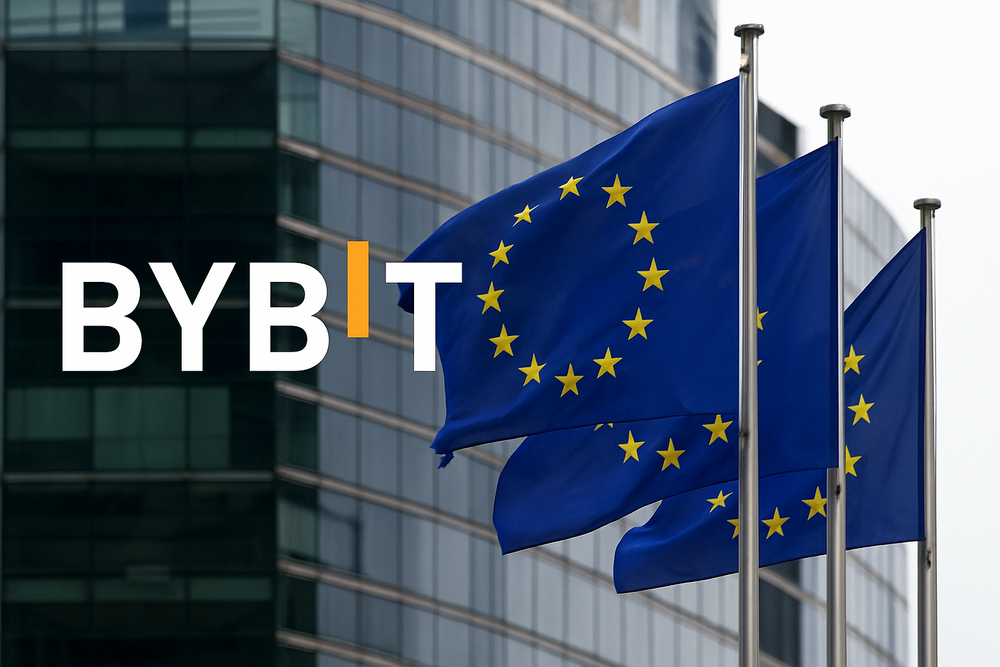Interview: Tong, PANews
Written by: Zen, PANews
Among the many cryptocurrency exchanges, Bybit and Binance share several similarities. Their founders, Ben and CZ, both have experiences studying and living abroad, the companies were both established in Shanghai and quickly expanded overseas to establish a foothold in the international market, with the Middle East now being a strategic stronghold for both. They even have offices located in the same area in Dubai. However, they also have notable differences; while Binance started with spot trading, Bybit has thrived on derivatives and gradually built a spot trading system, rising against the trend.
"Transcending boundaries" is how Ben defines Bybit's development over the past two years. In mid-April, Bybit organized the CCCC content creator event in Bali, where Ben shared the journey of Bybit over the past seven years, including safety upgrades and innovative products. PANews editor Tongtong was invited to serve as a mentor for the CCCC event and conducted an exclusive interview with Ben.
The highly publicized Bybit hacking incident has largely settled, and the crisis management has been praised by the industry as "textbook." In the interview, Ben Zhou candidly stated, "I have faced challenges alone since I was young, and this experience taught me how to remain calm in a crisis and mobilize team resources to respond to emergencies as quickly as possible." Because of this, in response to the shocking hacker attack in February, Ben not only promptly disclosed information and stabilized market expectations but also personally coordinated various departments for post-incident investigations and system repairs, demonstrating strong leadership and judgment.

Adjusting Security Philosophy After the Hacking Incident, Shifting to Openness and Transparency
On the night of February 21, 2025, Bybit experienced the largest hacking attack in the history of the cryptocurrency industry, with nearly $1.4 billion in assets stolen. The hackers attacked the third-party wallet service SafeWallet, stealing funds that were supposed to be transferred to hot wallets and dispersing them to multiple unknown addresses.
Less than half an hour after the incident, CEO Ben quickly grasped the situation. He released a message to the community on the X platform, briefly explaining the details of the hacking incident. An hour after the incident, Ben conducted a live stream, providing real-time updates and detailed explanations for over two hours. "Bybit is solvent; even if we cannot recover the losses from the hackers, all customer assets are backed 1:1 and can cover the losses." Despite the massive scale of the hacking attack, Bybit assured users that its 1:1 reserves could ensure asset safety.

Ben previously revealed in an interview that he did not have many emotions in response to this sudden event because the first priority was to think about how to handle the situation. This strong ability to withstand pressure may be related to his upbringing during his teenage years. At the age of 12, Ben left the country alone to study in New Zealand. Without parental care or any relatives to look after him, he often had to face and solve various problems in life and study on his own.
"I am not very sensitive to the amount itself; I focus more on data indicators," Ben stated. He did not pay much attention to the absolute amount of losses in this incident but was more concerned about how to resolve it. "What frustrates me the most is knowing that I could have done better but didn't." Reflecting on the hacking incident, Ben expressed that his biggest regret was that he had previously focused more on business rather than investing time and energy into managing the security and technology teams.
"My style is detail-oriented; in fact, some mechanisms could have been avoided." From the day after the incident, Ben began to also serve as Chief Technology Officer, focusing on security and technology, which changed the entire security team's philosophy from a closed management approach to one of openness and transparency. As of April 10, Bybit had completed five rounds of internal security audits and four rounds of external audits after the hacking incident, upgrading more than 50 security measures. "After having external third-party institutions conduct audits, many other issues were also discovered," Ben believes that being capable of transparency is the safest approach, and the greatest value of this is being able to regularly and clearly communicate with top global security experts about Bybit's structure and listen to their advice.
The hacking incident highlighted the good brand and trust that Bybit has established in the cryptocurrency industry and showcased the industry's unity in combating security threats as it matures.
How the "Huangpu Military Academy" of Exchanges Was Forged
Even under extreme pressure during the crisis of the hacking incident, Bybit's withdrawal and product services remained smooth, allowing customers to contact the support team and their account managers at any time, with the team maintaining full preparedness and efficiency. This is related to Bybit's corporate culture and organizational strength.
"We now joke that Bybit is the 'Huangpu Military Academy'; people who come out of here easily find jobs," Ben humorously remarked during the interview. Previously, PANews had conducted an exclusive interview with Bybit COO Helen, who, as an HR professional, described herself as a "non-typical" executive in the cryptocurrency exchange industry. She stated that Bybit promotes a "Work hard, play hard" culture, and the company's productivity is among the highest in the industry.

"Helen comes from an HR background; she focuses on people and organization. The role of leaders in our company is not just to set direction but to support those below in achieving their goals," Ben explained. This is especially true for Helen as COO, whose work is more about support and promotion. He added, "If you say you want to do something, we will provide you with resources and help you implement it; you need to ensure that it can be done, and we will cooperate with your pace to push it forward."
Of course, this also places relatively higher work pressure and intensity on Bybit. Helen had previously mentioned that Bybit encourages capable employees to take on multiple roles, and correspondingly, Bybit provides generous incentive rewards through performance evaluations for high-performing employees. Earlier this year, Binance and Bitget disclosed that they had issued substantial year-end bonuses to employees, drawing industry attention. Bybit, which emphasizes "results-oriented" performance, is no exception. Ben stated that the rewards they provide for high-performing employees are quite substantial, with the best-performing team of the year receiving a bonus multiplied by a factor of 1.8; last year, the spot trading team was one of the best.
Since founding Bybit in 2018, Ben has personally trained new employees every month. During the training process, he always poses a "soul question" to newcomers: "Why did you come to Bybit? If you are looking for a comfortable environment, you have come to the wrong place." Ben candidly stated that Bybit aims to strive for global leadership, which may mean sacrificing weekends, and he himself does not take weekends off at all. "But the environment we create is—if you want to get things done, we will fully support you, and you will find it very rewarding."
Innovation Drives Growth: Gold Spot Trading and the "Lifesaving" RPI Mechanism
For employees who are determined to work hard and give their all, Bybit provides fertile ground and ample nourishment, and this culture has opened up vast innovation space for the exchange.
In late January of this year, Bybit announced the launch of Bybit Pay in Brazil, a payment solution that connects traditional banking systems with Web3, providing end-users with seamless payment services that can be integrated with Brazil's leading payment system, Pix. This innovative business was launched by Bybit's fiat team, based on the friendly regulatory environment and high adoption rate of cryptocurrencies in Brazil, after thorough market research. Aside from project initiation, resource allocation, and manpower decisions, Ben did not get too involved in the Bybit Pay product. He admitted, "I did not participate in this product from the beginning; I directly gave the team space to innovate and meet market needs."

In fact, in addition to continuously optimizing core spot and derivatives businesses, Bybit Pay is just the tip of the iceberg in terms of Bybit's business model innovation.
Currently, the gold rush is sweeping the globe, and as early as August 2024, Bybit became the first cryptocurrency exchange to support gold spot trading priced in USDT, launching the "Gold & Forex Copy Trading" feature in January this year, allowing users to follow professional traders' strategies in gold and forex. Additionally, Bybit officially launched CFD products such as crude oil and stock indices on the MetaTrader 5 (MT5) platform, allowing users to trade global commodities and indices directly using USDT.

These initiatives not only attract more participants from traditional financial markets but also enable Bybit to achieve considerable trading volume and liquidity even during bear markets. With the help of these diversified products and innovative features, Bybit set a historical record of $107 billion in total trading volume in a single day in August 2024, quadrupling its previous average level and firmly establishing itself as the second-largest cryptocurrency exchange globally. Furthermore, with the recent surge in gold prices, on April 17 of this year, the trading volume of gold on the Bybit platform reached $24 billion in a single day.
After the hacking incident, Bybit achieved a strong recovery in just one week. A report from Block Scholes indicated that the RPI (Retail Price Improvement) mechanism deployed by Bybit was a key factor in the exchange's rapid recovery, stating, "With the timely launch of RPI orders, Bybit stabilized its liquidity situation and began to rebuild its share in overall cryptocurrency spot trading." The RPI was launched just days before the hacking incident, designed for retail users and matched only with non-algorithmic orders, thereby ensuring fairness while deeply activating the platform's order book. Ben also compared the liquidity depth of Bybit and Binance for the top 200 cryptocurrencies, with results far exceeding industry levels.

Abandoning Web3 Wallet Business, Striving to Become a One-Stop Asset Management Platform
In recent years, centralized exchanges have been striving to become the preferred gateway to the Web3 ecosystem, with the "CEX + Web3" hybrid strategy seemingly becoming a standard for cryptocurrency trading platforms. CEXs are no longer just perceived as traditional trading facilitators but also as builders and developers of Web3's underlying infrastructure and products. However, Bybit seems to be going against this trend.
On April 16, Bybit announced an important update regarding adjustments to its Web3 products and services, declaring that it would terminate multiple Web3 services as part of its strategic transformation. According to the announcement, Bybit will stop its Cloud Wallet and Keyless Wallet services on May 31 of this year and plans to close several Web3 trading functions during the same period, including its DEX Pro platform, Swap & Bridge services, and a broader NFT marketplace.
Prior to this, as of April 8, Bybit had already ceased support for several products, including Inscriptions, NFT Pro, ApeX, Buy Crypto, and its Initial DEX Offering (IDO) platform, with its Web3 Points program also set to end on April 28.
"We recently made a decision to only retain mnemonic wallet services," Ben stated in the interview. When Bybit became the second-largest exchange in the world a year ago, he informed the team to remove market share from core business metrics, emphasizing that they should not be limited to market share. He believes that for Bybit, which has the genes of a dark horse, transitioning from merely copying quickly to achieving true innovation is essential for the platform's next stage. Therefore, to refocus resources and concentrate on providing a more efficient and user-centered experience, it is necessary to streamline Web3 products, including wallet services that major players like Binance and OKX are heavily promoting.
Ben pointed out that even during a bear market, centralized exchanges can still operate normally because they occupy a critical position in the industry. "I asked the team: 'Is the wallet the throat of Web3?' No one could answer." He further questioned the team about what the throat of Web3 is, but there was still no conclusion. "However, one conclusion is—wallets are definitely not the throat," Ben added, explaining that the usage priority of DApps far exceeds that of wallets themselves. If mainstream DEXs like Jupiter, Raydium, or Uniswap do not support a particular wallet, users will readily switch to another compatible wallet because DApps are their core need. This indicates that Web3 wallets lack irreplaceable value as traffic entry points.
Moreover, the barriers between wallets are extremely low, and the cost for users to switch is minimal, allowing for easy migration of assets between multiple wallets. Transfers are also very convenient, making it difficult to build a moat between wallets, resulting in weak user stickiness and long-term retention. This leads to competition among wallets ultimately evolving into a race of "who can attract more yield farmers," and this behavior of "attracting short-term traffic through incentives" is not only unsustainable but also fails to construct the ecological logic of "user sovereignty, protocol collaboration, and win-win" that Web3 truly advocates. Ben clearly stated: "Yield farming is not the core of Web3, nor is it the future's throat."
"I believe that ultimately everyone will strive to become a one-stop asset management platform." Ben pointed out that due to habit, most users are unwilling to frequently register or switch platforms for different assets, even if another platform has lower fees; they prefer to operate in a familiar environment. Therefore, only through a unified platform that encompasses a full range of products, including U.S. stocks, precious metals, and cryptocurrencies, can funds be maximized, enhancing stickiness and cross-selling opportunities.
Returning to the European and American Crypto Markets
In recent years, the global cryptocurrency market has been accelerating towards compliance, with regulatory agencies in various countries introducing or improving frameworks to balance innovation and risk. Based on the UAE government's open policies towards digital assets, a mature and forward-looking regulatory framework, and its advantageous geographical and economic position, Bybit quickly established its global headquarters in Dubai after receiving IPA approval from the UAE Ministry of Economy in 2022. In February of this year, Bybit obtained the "Principle Approval" (IPA) issued by the UAE Securities and Commodities Authority (SCA), allowing it to establish a virtual asset platform operator in the UAE, marking its final stage in obtaining a comprehensive operating license.
For Bybit, which aims to become a global one-stop asset management platform, returning to Europe and entering the U.S. market is currently its most important goal in its international strategy.
"Bybit's mission is to provide a safe and reliable trading experience for the entire cryptocurrency community, supported by a strong regulatory framework. To ensure we meet the highest standards and pave the way for a safer and more sustainable future for the industry, we proactively decided to temporarily adjust our operations in the European Economic Area (EEA)." At the end of last year, in response to the Markets in Crypto-Assets Regulation (MiCAR), Bybit announced its temporary exit from the European market.

In February of this year, Bybit was removed from the "blacklist" by the French Financial Markets Authority (AMF) through proactive actions, ending the regulatory turmoil that had persisted since 2022, which is seen as a key turning point for its return to the European market. "Bybit is actively seeking to obtain the MiCAR license in Austria," Ben stated, noting that the previous hacking incident had no impact on this. Once the relevant license is obtained, Bybit can resume cooperation with EEA clients in accordance with applicable laws.
Since Trump took office as President of the United States in January, he has sent strong signals through various executive measures, providing a more relaxed regulatory environment for the digital asset industry. In the face of this open door, Bybit, which previously had no U.S. operations and had not even hired U.S. employees, began exploring the possibility of entering the U.S. market.
In addition to the European and American markets, Bybit is also looking at the Hong Kong region. In February of last year, Bybit's Hong Kong entity, Spark Fintech Limited, submitted an application for a Virtual Asset Trading Platform (VATP) license to the Hong Kong Securities and Futures Commission (SFC). Later, Bybit discovered that the licensed person in charge of its subsidiary had not completed the procedures before transferring to Bybit, resulting in a dual identity issue, leading to the decision to withdraw the application. Currently, Bybit has reapplied for the VATP license, and Ben emphasized: "Hong Kong is very welcoming for us now."
免责声明:本文章仅代表作者个人观点,不代表本平台的立场和观点。本文章仅供信息分享,不构成对任何人的任何投资建议。用户与作者之间的任何争议,与本平台无关。如网页中刊载的文章或图片涉及侵权,请提供相关的权利证明和身份证明发送邮件到support@aicoin.com,本平台相关工作人员将会进行核查。



